I’ve been hearing a lot lately about how important it is to vote. Supposedly, if you vote for alternative Candidate X, then it is a de facto vote for Candidate Y. This Candidate Y could be either Trump or Clinton depending on the ideology of the one spewing this rhetorical nonsense. Nevermind that this line of argument places way too much stock in the value of a single vote. As political philosopher Jason Brennan points out, the disutility of driving to cast your ballot (i.e., the risk of harming others via an automobile accident) is higher than the actual utility of your single vote (i.e., the chance it has of changing the election outcome).[ref]See The Ethics of Voting, pgs. 19-20.[/ref] The value of a single vote is vanishingly small, even in swing states. You have a better chance of winning the Powerball jackpot 100+ times in a row than you do of casting the tiebreaker in a presidential election.
But when only 9% of the American public is behind the nominations of Trump and Clinton, shouldn’t we encourage more people to vote? I suppose that depends on how your political preferences match up with that of non-voters. So what are the preferences of non-voters? According to a 2014 Pew study, non-voters are a largely younger, poorer, uneducated, racially diverse group. More important, however, are their political affiliations and views: while the largest portion identified as Independents (45%), 29% identified as Democrats, leaving only 18% for Republicans. Furthermore, 51% indicated that they “lean Democrat” with only 30% “lean[ing] Republican” (20% said they had “no lean”). Fifty-three percent of non-voters held unfavorable views of Republicans (35% favorable), while only 40% held unfavorable views of Democrats (48% favorable). Their views on the Affordable Care Act were mixed (44% approved, 49% disapprove). Their views on government efficiency (54% think government is almost always inefficient, 43% think the government deserves more credit) and aid to the poor (44% said it did more harm than good, 51% said the opposite) were a bit more divided.
A 2012 Pew study highlighted the policies preferred by non-voters. At that time, Obama held a favorable view among non-voters (64%), 59% of which said they preferred him as their presidential candidate. The majority of non-voters believed that government should do more to solve problems (52%), should raise tax rates for incomes above $250,000, remove troops from Afghanistan ASAP (67%), allow same-sex marriage (49%), and legalize abortion in all/most cases (54%). They were more mixed on the United States’ stance toward Iran’s nuclear program (45% said take a firm stand, 40% said to avoid military conflict) and the growing population of immigrants (27% said it is a “change for the better,” 34% said it is a “change for the worse,” 34% said it “hasn’t made much of a difference”).
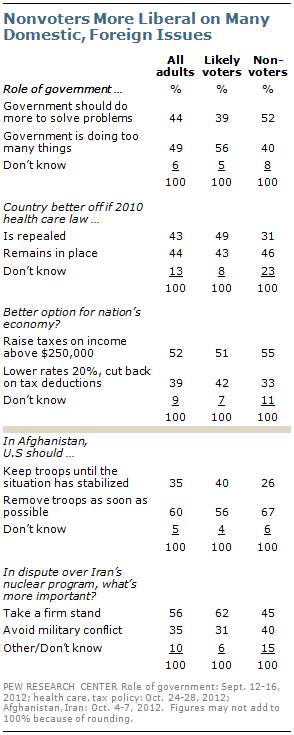
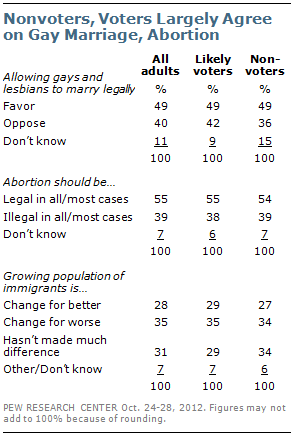
As reported in The New Yorker,
In 2013, the political scientists Jan Leighley, of American University, and Jonathan Nagler, of New York University, published the results of a study that compared, among other things, the political views of voters and non-voters, dating back to 1972. On most social issues (abortion, L.G.B.T. rights), there was no measurable difference between them. Non-voters were more inclined toward isolationism. (Leighley and Nagler thought this might be because non-voters knew more soldiers than voters, and were more reluctant to see them sent into conflict.) The difference on economic matters was much more dramatic. Non-voters, Leighley and Nagler found, favored much more progressive economic policies than voters did. They preferred higher taxes, and more spending on schools and health care, by margins that hovered around fifteen per cent. “The voters may be representative of the electorate on some issues,” Leighley and Nagler wrote, “but they are not representative of the electorate on issues that go to the core of the role of government in modern democracies.” That non-voters had the same partisan preferences as voters only seemed to strengthen the finding—they wanted more redistribution regardless of whether they were Democrats or Republicans.
These results have been substantiated elsewhere. As reported in The Atlantic,
Four questions from the American National Elections Studies (ANES) data show a stark divide on issues related to economic inequality. Nonvoters tend to support increasing government services and spending, guaranteeing jobs, and reducing inequality—all policies that voters, on the whole, oppose. Both groups support spending on the poor, but the margin among nonvoters is far larger. Across all four questions, nonvoters are more supportive of interventionist government policies by an average margin of 17 points.
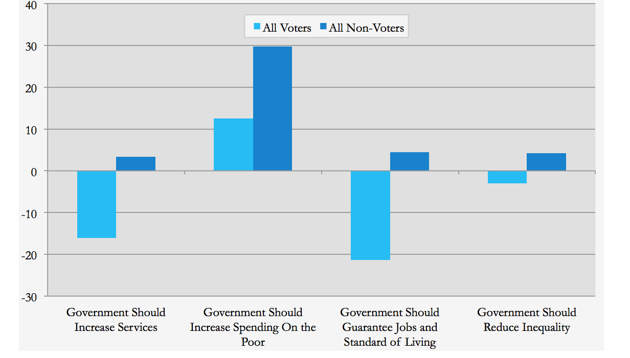
Similar results were found with numbers from Pew and YouGov comparing “registered voters with the non-registered population. These polls were not taken close to elections, so registration can serve as a rough proxy for the voting and nonvoting population. The polls show the same dramatic differences. In every instance, net support for greater government intervention in economic affairs was higher for the non-registered populations—sometimes dramatically so. For instance, while net support for free community college was 7 points for the registered population, it was 46 points within the non-registered population.”
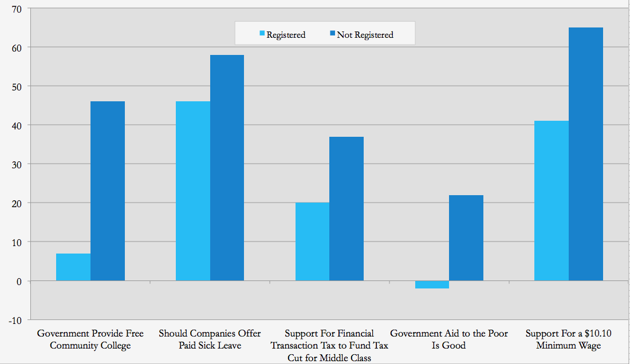
In short, non-voters tend to be more ideologically liberal than voters.
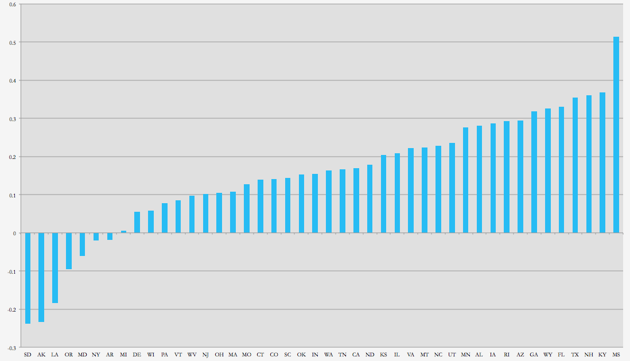
If you’re wanting to galvanize non-voters, you should know your audience. Liberals may have a more vested interest in doing so than conservatives. Libertarians will likely have mixed feelings.
Non voters will make as much difference in this election as they did in the 2012 election when 3-5 million evangelical voters stayed home because Romney was not Christian enough ( or not Christian due to being a Mormon) and you can see what we got because of that. We’ll now have another large group that will stay home due to Trump not being republican enough or sophisticated enough in his language to suit their own “sophistication ” and look what we’ll get in return for their sense of self importance. Half a million more Syrian refugees , no more American border and a Supreme court packed to suit Hillary. I hope you “never Trump” people will feel real proud of yourselves when your gun rights and American rights are gone
C. Givens-
I don’t think you read the actual article. Walker’s point–and it’s backed by lots and lots of data–is that folks who don’t vote tend to skew liberal. If they all voted, that would be worse for the Republicans (Trump or no Trump) and worse for people with conservative or libertarian views.
What you’re grumpy about isn’t really about people not voting (in general), but rather about not enough people voting the way you want them to. :-)
As for your fears: President Obama had 8 years. For some of that time, he had Democratic control of House and Senate. He presided over multiple major mass shootings, including the Sandy Hook massacred which was–emotionally–probably the worst mass killing our country has seen in a 100 years.
Over all that time, what gun laws were passed?
Now look at the campaign right now. Where, on the list of hot-button issues, do you see gun rights? How often does it come up in the ads? The debates? The op-ed pieces?
The reality is that we’re living at a time of unprecedented victory for gun-rights supporters. Concealed carry laws are at an all time high, permit holders are at an all-time high, and the Democrats can’t even muster enough support to re-instate an Assault Weapons Ban despite a 2-term presidency and majorities in House and Senate to boot.
So why is that even on your list of fears?
When the right-wing media told me Eric Holder was going to come get my guns, I freaked out and went and bought an AR-15 for over $1,000. Not only are they not banned, but you can pick up the same model for less than $700.
Fool me once, shame on you. Fool me twice, shame on me.
The point of this example is that journalists live off of fear. Fear sells. When I look out at the Democrats and the Republicans today all I see are two parties dedicated to selling different brands of fear.
And I’ve got to tell you: fear doesn’t look good on America. It’s not what we’re made of. It’s not where we came from. And I don’t want it to be our future. We live at basically the safest, most prosperous time in human history. We’ve got people ready to upend our civil liberties and dictate our foreign and domestic policy because a small band of uneducated terrorists have succeeded in killing a few hundred unarmed civilians over the past few years.
For crying out loud, this is the nation that stood toe-to-toe with the USSR for half a century when there were enough nuclear weapons on the table to turn the surface of the planet to glass. We didn’t succumb to fear then, and it’s no surprise that the Cold War was won when we had one of our most optimistic presidents of all time in office, Ronald Reagan.
But after that legacy, after staring nuclear annhilation in the face and deciding that would be a great time to send people to the moon, we live in a nation that hasn’t sent anyone out of low earth orbit in my lifetime.
We should have been having nightmares during the Cold War, but somehow we managed to dream. And today, when global poverty is down, when global wars are down, when global education and trade and prosperity are at all time highs, our entire nation is positively addicted to fear.
That’s why I’m #NeverTrump.
It’s not because I don’t have principles.
It’s because I’m done with fear.
Nathaniel. Here I am, standing and clapping slowly because that was amazing.